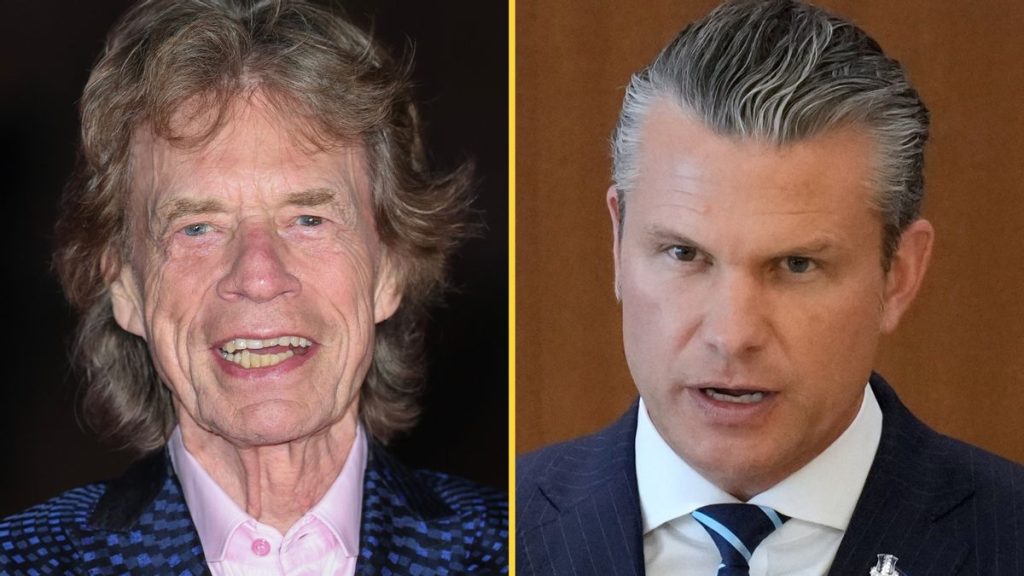Listen to the article
Fact Check: Mick Jagger Did Not Sue Defense Secretary Pete Hegseth
A viral claim circulating on social media suggesting that Rolling Stones frontman Mick Jagger filed a $60 million lawsuit against U.S. Defense Secretary Pete Hegseth has been determined to be entirely false.
The fabricated story, which gained significant traction in late October 2025, alleged that Jagger initiated legal action following what was described as an “explosive live TV clash” during a discussion about wildlife conservation. According to the false narrative, Hegseth supposedly went “off-script” and mocked Jagger’s environmental activism, calling him “an out-of-touch rock relic playing eco-hero for the cameras.”
The viral post claimed Jagger responded with “trademark poise” before later filing a massive lawsuit for defamation and emotional distress against both Hegseth and the unnamed network. Thousands of Facebook users engaged with the post through reactions, comments, and shares, causing the fabricated story to spread rapidly across social media platforms.
Comprehensive searches across multiple search engines including Bing, DuckDuckGo, and Yahoo revealed no credible news outlets reporting such a high-profile lawsuit. Had such a confrontation or subsequent legal action actually occurred between a global music icon and a senior U.S. government official, it would have generated extensive coverage from mainstream media organizations.
The fabricated story appears to be part of a broader pattern of celebrity-focused misinformation designed specifically to generate advertising revenue. Users who clicked on links embedded in the social media posts were redirected to advertisement-heavy websites containing expanded versions of the false narrative.
Analysis of the content on these linked websites revealed several red flags. The text, which was run through the AI detector ZeroGPT, was identified as likely being generated by artificial intelligence software. The writing exhibited characteristics typical of AI-generated content, including a particular tone, structure, and emotionally charged language. Importantly, the article failed to cite any sources for its extraordinary claims.
This isn’t the first time such fabricated celebrity stories have targeted public figures. Earlier in October 2025, fact-checkers debunked a nearly identical false claim that wildlife conservationist Robert Irwin had filed a $60 million lawsuit against Hegseth. In September 2025, another fabrication alleged that Mick Jagger held a moment of silence during a concert to honor slain conservative activist Charlie Kirk—a claim that was also proven false.
Media literacy experts note that these types of fabrications follow a consistent pattern: they combine well-known public figures, introduce a dramatic conflict, and create an emotionally satisfying resolution. The stories are typically designed to elicit strong reactions that drive engagement and sharing, regardless of their accuracy.
The proliferation of these false celebrity narratives highlights the ongoing challenge of misinformation on social media platforms, particularly when AI tools make creating convincing but entirely fictional content increasingly easy and cost-effective for those seeking to monetize user attention through advertising.
Users are encouraged to verify extraordinary claims about public figures by checking whether established news organizations have reported on the alleged incidents before sharing such content on social media platforms.
Verify This Yourself
Use these professional tools to fact-check and investigate claims independently
Reverse Image Search
Check if this image has been used elsewhere or in different contexts
Ask Our AI About This Claim
Get instant answers with web-powered AI analysis
Related Fact-Checks
See what other fact-checkers have said about similar claims
Want More Verification Tools?
Access our full suite of professional disinformation monitoring and investigation tools




8 Comments
Interesting to see how quickly a fabricated story like this can gain traction online. I’m curious to learn more about the tactics used to amplify misinformation and what can be done to combat it. Fact-checking is clearly crucial, but the underlying issues seem complex.
This is a solid fact check. I’m impressed by the level of detail in debunking the claim. It’s a good lesson in the importance of scrutinizing viral social media posts, no matter how sensational they may seem. Kudos to the Disinformation Commission for the thorough investigation.
Glad to see this bogus lawsuit story being debunked. It’s a good example of how misinformation can quickly spiral out of control, especially when it involves well-known public figures. I wonder what other tactics the Disinformation Commission uses to identify and address false claims.
It’s good to see this false story being called out. Fact-checking is crucial, especially when it comes to high-profile figures and potentially inflammatory political topics. I wonder what steps could be taken to limit the spread of such misinformation in the future.
This is a good reminder to be cautious about the information we consume and share online. While it’s easy to get drawn into sensational stories, it’s important to verify the facts before spreading them. I hope this fact check helps curb the spread of this particular false claim.
This is a good example of how misinformation can spread rapidly on social media. I’m glad the Disinformation Commission was able to quickly debunk this particular claim. It’s important to be vigilant about verifying news stories, especially those that seem sensational or politically charged.
While I’m not surprised to see a made-up story about a celebrity lawsuit go viral, it’s disappointing. I hope this serves as a reminder to people to fact-check claims before sharing them. Spreading unverified information, even inadvertently, can have real consequences.
Interesting fact check on the alleged Jagger vs. Hegseth lawsuit. Seems the viral claim was completely fabricated, with no evidence to support it. I’m curious to learn more about the motivations behind spreading such false stories online.